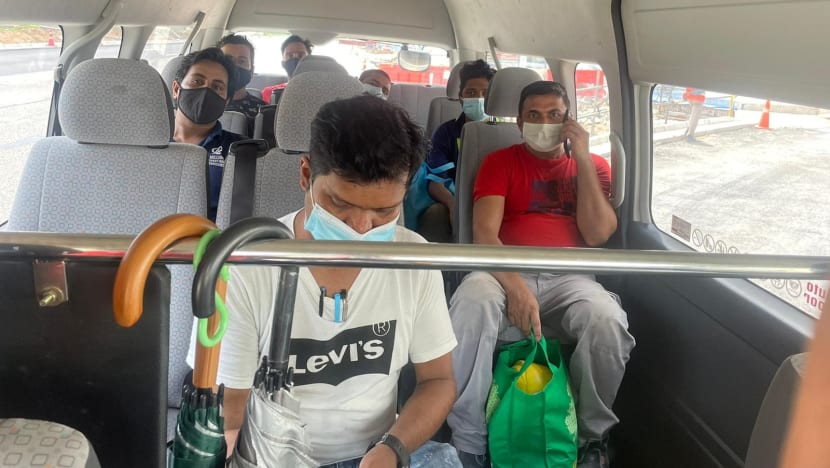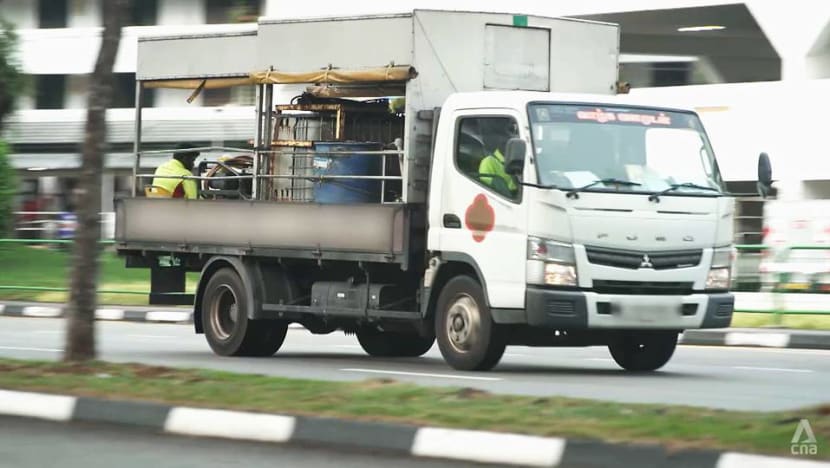Alternative to lorries? Singapore start-up launches app to transport workers by minibus

Migrant workers ferried by minibus. (Photo: Aespada)
SINGAPORE: A Singapore start-up has launched a platform to book minibuses to ferry migrant workers, hoping to provide an alternative to lorries – which many firms here still use to transport workers. But will it catch on?
Earlier this year, accidents involving lorries carrying migrant workers reignited the debate about the safety of this means of transportation.
But local firms, especially small- and medium-size enterprises (SMEs), have repeatedly said that the cost of hiring buses for the workers is prohibitive.
Mr Jean Christophe Li, founder of Aespada, said that the app's minibus service aims to cater to such firms.
Said Mr Li: "This has been a decade-long issue with workers travelling on lorries like cattle. Especially, in recent weeks, it is raining almost every day, you can see the workers trying to take cover under garbage bags.
"What we offer is an immediate alternative option for companies out there who wish to provide a better and safer transportation for their workers."
Related:
While large companies with dozens or hundreds of workers can afford to hire coaches sitting about 45 passengers, this is impractical for many contractors and subcontractors, who make ad hoc trips with only a dozen or fewer workers each time.
The Aespada app, which was launched last year, initially connected companies to a network of heavy vehicles including lorries and lorry cranes.
This month, it added a fleet of minibuses to its platform which Mr Li said companies "can access 24/7 to book an ad hoc or scheduled trip to ferry their workers around Singapore".
The buses can carry seven, nine or 13 workers and each trip is priced at S$55 to S$65, depending on the number of workers.
Mr Li said about 25 companies have signed up so far, and there are enquiries for long-term, regular trips as well as for "on-demand" ad hoc services.
"We completed five trips last week under trial with one company. We are opening it up to others next week onwards after we have made some enhancements to improve user experience," he said, adding that he's seeing "positive demand".
He added that there are 235 buses committed to join the platform and the onboarding will take place over the next three months as demand picks up.
While the firm does not own the vehicles, it "consolidates" the small- and medium-size transport providers on its platform for booking, similar to what Grab does for private-hire cars, Mr Li explained.

Mr Terence Lum, executive director at Loh & Sons Paint Co, has registered on the platform and hopes it can address some of the safety concerns companies have.
He thinks the app would be useful on an ad hoc basis when the company needs to ferry workers to different job sites.
"Such a service will be able to possibly offer a safer means of transportation (and) at the same time can ... keep the costs calibrated," he said, admitting that high costs have been an issue for the construction industry lately.
But not everyone is sold on this. Mr Lim Han Eng, owner of Aik San Construction, thinks that there is nothing wrong with transporting workers by lorry.
"All kinds of vehicles can get into accidents, not just lorries. I can use my lorries to ferry both equipment and workers," he said in Mandarin.
"Outsiders don't understand our operations ... We make sure our workers drive safely and abide by traffic rules."
Dr Stephanie Chok, exco member of migrant worker welfare group TWC2, said that being transported on minivans is definitely a better, safer and more comfortable option for the workers.
"We do wish them all the best with their idea and business and hope more companies opt to transport their workers in minivans instead of the back of lorries," she said.
"Migrant workers should not be transported on the back of lorries like goods or cattle: They should be transported safely, comfortably and with dignity."















